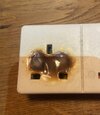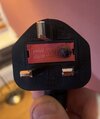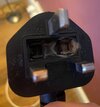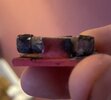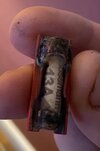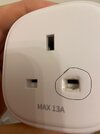Hi all, appreciate any insight on this
Electrical novice here.
I have an 1800W infrared heater mounted on the wall in my conservatory/lounge. This is plugged into a 4 way gang plug (as built-in lead too short), in turn plugged into a Meross smart plug so I can turn off and on remotely. All rated at 13W. The wall socked is a 2-gang, the only other thing plugged in to the wall is a normal floor lamp, and nothing else on the gang for the heater.
I had recently noticed some slight melting on the Meross plug on one of the socket holes so I replaced it. However I had a closer look to see what was going on today. The plug for the gang going into the smart plug seemed OK, didn't feel hot. But the heater plug going into the gang was blazing hot! When it cooled down I could see the area round the fuse is melted and the gang plug is severely heat damaged. Needless to say none of this is being switched back on !
Any insights as to the cause and what I can do? I understand (googling) that high wattage devices may cause their plugs to heat a little, but this is way beyond that. Could it be that a little heat over time damages the plug causing more of a meltdown? Should I just rewire a new plug ?
At some point the gang plug itself was affected as it impacted the smart plug, could the problem cascade down the chain?
And could any of this be caused by the house electrics themselves rather than then devices?
Any help gratefully received . For now it's back to the blow heater
Mick
Electrical novice here.
I have an 1800W infrared heater mounted on the wall in my conservatory/lounge. This is plugged into a 4 way gang plug (as built-in lead too short), in turn plugged into a Meross smart plug so I can turn off and on remotely. All rated at 13W. The wall socked is a 2-gang, the only other thing plugged in to the wall is a normal floor lamp, and nothing else on the gang for the heater.
I had recently noticed some slight melting on the Meross plug on one of the socket holes so I replaced it. However I had a closer look to see what was going on today. The plug for the gang going into the smart plug seemed OK, didn't feel hot. But the heater plug going into the gang was blazing hot! When it cooled down I could see the area round the fuse is melted and the gang plug is severely heat damaged. Needless to say none of this is being switched back on !
Any insights as to the cause and what I can do? I understand (googling) that high wattage devices may cause their plugs to heat a little, but this is way beyond that. Could it be that a little heat over time damages the plug causing more of a meltdown? Should I just rewire a new plug ?
At some point the gang plug itself was affected as it impacted the smart plug, could the problem cascade down the chain?
And could any of this be caused by the house electrics themselves rather than then devices?
Any help gratefully received . For now it's back to the blow heater
Mick


